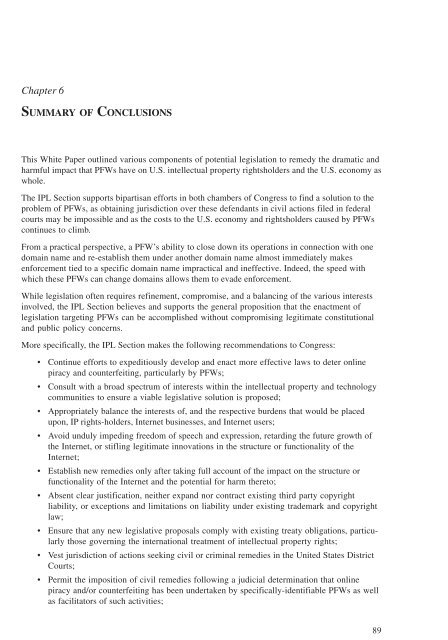1oz61wa
1oz61wa
1oz61wa
You also want an ePaper? Increase the reach of your titles
YUMPU automatically turns print PDFs into web optimized ePapers that Google loves.
Chapter 6<br />
SUMMARY OF CONCLUSIONS<br />
This White Paper outlined various components of potential legislation to remedy the dramatic and<br />
harmful impact that PFWs have on U.S. intellectual property rightsholders and the U.S. economy as<br />
whole.<br />
The IPL Section supports bipartisan efforts in both chambers of Congress to find a solution to the<br />
problem of PFWs, as obtaining jurisdiction over these defendants in civil actions filed in federal<br />
courts may be impossible and as the costs to the U.S. economy and rightsholders caused by PFWs<br />
continues to climb.<br />
From a practical perspective, a PFW’s ability to close down its operations in connection with one<br />
domain name and re-establish them under another domain name almost immediately makes<br />
enforcement tied to a specific domain name impractical and ineffective. Indeed, the speed with<br />
which these PFWs can change domains allows them to evade enforcement.<br />
While legislation often requires refinement, compromise, and a balancing of the various interests<br />
involved, the IPL Section believes and supports the general proposition that the enactment of<br />
legislation targeting PFWs can be accomplished without compromising legitimate constitutional<br />
and public policy concerns.<br />
More specifically, the IPL Section makes the following recommendations to Congress:<br />
• Continue efforts to expeditiously develop and enact more effective laws to deter online<br />
piracy and counterfeiting, particularly by PFWs;<br />
• Consult with a broad spectrum of interests within the intellectual property and technology<br />
communities to ensure a viable legislative solution is proposed;<br />
• Appropriately balance the interests of, and the respective burdens that would be placed<br />
upon, IP rights-holders, Internet businesses, and Internet users;<br />
• Avoid unduly impeding freedom of speech and expression, retarding the future growth of<br />
the Internet, or stifling legitimate innovations in the structure or functionality of the<br />
Internet;<br />
• Establish new remedies only after taking full account of the impact on the structure or<br />
functionality of the Internet and the potential for harm thereto;<br />
• Absent clear justification, neither expand nor contract existing third party copyright<br />
liability, or exceptions and limitations on liability under existing trademark and copyright<br />
law;<br />
• Ensure that any new legislative proposals comply with existing treaty obligations, particularly<br />
those governing the international treatment of intellectual property rights;<br />
• Vest jurisdiction of actions seeking civil or criminal remedies in the United States District<br />
Courts;<br />
• Permit the imposition of civil remedies following a judicial determination that online<br />
piracy and/or counterfeiting has been undertaken by specifically-identifiable PFWs as well<br />
as facilitators of such activities;<br />
89


